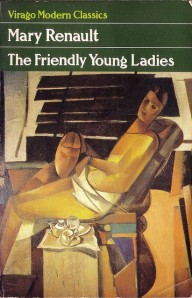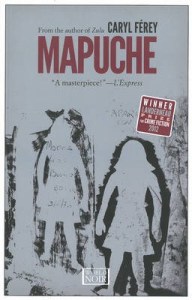Although I have read some excellent books this month, I have also read my share of second-rate books. One is so contrived and mawkish I almost refrained from writing about it, the second is the most violent book I have ever read, and Dickens’ early novels were not all classics.
Oh, Viragos, I thought. Oh, Europas. Oh, Dickens. I can read these very good books without screening them for quality.
Not so.
I hoped to enjoy Mary Renault’s The Friendly Young Ladies, a library book I picked up because it’s a Virago; I recently read and loved her novel Fire from Heaven. Caryl Ferey’s Mapuche (Europa) says on the cover, Winner Larderneau Prize for Crime Fiction 2012. And I decided to reread The Old Curiosity Shop to prepare for the Dickens tour I may or may not take on my trip to London.
I must have been brainwashed by the Virago/Europa reputation. And if I didn’t like The Old Curiosity Shop years ago, is it likely that I’d like it now?
Many of my blogger friends love books published by a single publisher, whether it be Virago, Europa, NYBR, or Dalkey Archive. (I do like many of these publishers’ books, but not all.) At my old blog, I accidentally alienated several English bloggers by gently mocking Virago Week (or was it Persephone Week?), and you don’t want to get the English riled up. Fortunately the Europa fans didn’t mind when I gently mocked the Europa Challenge, probably because they’re Americans. (And I read two outstanding Europa books last year, Elena Ferrante’s My Brilliant Friend and Jane Gardam’s Crusoe’s Daughter.)
Well, anyway, let’s take one of these books at a time.
 Mary Renault’s The Friendly Young Ladies. Though I was dazzled by Fire from Heaven, a novel about Alexander the Great, this is one of the worst books I’ve ever read.
Mary Renault’s The Friendly Young Ladies. Though I was dazzled by Fire from Heaven, a novel about Alexander the Great, this is one of the worst books I’ve ever read.
I can only think Virago published this because it’s an early example of gay lit, or queer lit.
Some of the scenes are fascinating, but the writing is maudlin.
Renault does a masterly job of portraying Elsie, a silly teenager who runs away to find her sister Leo, who left under a cloud years ago. Peter, a doctor she has a crush on, suggests it will help Elsie get over her inhibitions. Peter is a Freudian who likes to flirt with his patients and then dump them.
Elsie thinks Leo may be a prostitute. Hardly. Leo, a writer of Westerns who often dresses in mannish clothes, lives on a houseboat with Helen, a beautiful nurse, and yes, she and Helen are lesbians, or are they? Or aren’t they? Or are they? Or aren’t they?
Leo and Helen sleep in the same bed. But they embrace men at parties.
What the f___, as I like to say.
And then they go home and sleep in the same bed again.
And they both gently make out with Peter (separately) and don’t respond much.
And Leo tries to seduce Peter’s girlfriend, not sexually, but by charming her off the houseboat. She is furious that Peter has brought a woman to their home when he knows Elsie is in love with him.
And Joe, a writer of literary fiction, is in love with Leo, who practically drowns so she won’t have to have sex with him. Joe invites Leo to go to Arizona with him, and explains he has had other relationships, and she says, “On my side there’s Helen. I don’t suppose you want to know anything about that, either.”
The houseboat scenes are good and really interesting. Leo is constantly pumping water, and she and Helen do a lot of boat housework. Helen really doesn’t like having Elsie around, because she doesn’t help at all and doesn’t have a job; their finances are squeezed.
And Helen is terrified of losing Leo. She had heterosexual relationships before meeting Leo, so got that out of the way, but Leo apparently has not.
Some of Pamela Frankau’s books, as I recall, also deal with gay life, but are more realistic and better-written. Some of them have been published by Virago.
Mary Renault in the Afterword seems surprised that Virago wanted to reissue this 1944 book. She laughs at parts of the book. She dislikes the word “gay,” makes fun of The Well of Loneliness (I haven’t read that one, but I do have a copy), and said that she wouldn’t be more explicit if she wrote it in the ’80s.
Congregated homosexuals waving banners are really not conducive to a good-natured ‘Vive la difference!’ Certainly they will not bring back the tolerant individualism of Macedon or Athens, where they would have attracted as much amazement as demonstrations of persons willing to drink wine.
 Caryl Ferey’s Mapuche. After the coup d’etat in Argentina in 1976, many people disappeared (the Desaparecidos). Ruben, one of the main characters, was tortured in a prison, and his father and sister died. He is now an investigator who helps a group called the Mothers of the Plaza de Mayo search for the Desaparecidos. He becomes involved with Jana, a Mapauche (an Indian of the pampas), after her friend, a transvestite named Paula/Miguel, is tortured and killed. A well-known photographer disappears at the same time, and her connection to Paula is sad and unexpected.
Caryl Ferey’s Mapuche. After the coup d’etat in Argentina in 1976, many people disappeared (the Desaparecidos). Ruben, one of the main characters, was tortured in a prison, and his father and sister died. He is now an investigator who helps a group called the Mothers of the Plaza de Mayo search for the Desaparecidos. He becomes involved with Jana, a Mapauche (an Indian of the pampas), after her friend, a transvestite named Paula/Miguel, is tortured and killed. A well-known photographer disappears at the same time, and her connection to Paula is sad and unexpected.
Ruben’s months in the prison as an adolescent are told in violent detail, but there are historical reasons for that. In the last 50 pages or so, when Jana takes revenge, hunting and tracking and using multiple weapons, even Ruben throws up at the violence. And I was close to it.
It is a political thriller, but not my kind of thing. It is badly-written, at least in translation. If you want it, it’s yours.
Dickens’ The Old Curiosity Shop. I love Dickens, but I tried to reread this one a few years ago, and couldn’t get past the wax works.
I’m having the same problem this year.
 The writing is vivid, but there’s not much of a plot. Little Nell takes care of her grandfather, a gambler who loses the Old Curiosity Shop to Quilp, a dwarf who causes havoc wherever he goes. The grandfather and Nell take off, meet some puppeteers on the road, and then meet Mrs. Jarley, a kind of Madame Tussaud, and Nell becomes a docent for the wax works. But her grandfather gambles away their money and..
The writing is vivid, but there’s not much of a plot. Little Nell takes care of her grandfather, a gambler who loses the Old Curiosity Shop to Quilp, a dwarf who causes havoc wherever he goes. The grandfather and Nell take off, meet some puppeteers on the road, and then meet Mrs. Jarley, a kind of Madame Tussaud, and Nell becomes a docent for the wax works. But her grandfather gambles away their money and..
I really love most of Dickens’ books, but this one is not very compelling. It’s not actually a bad book, but it’s not very good.
Disappointing to read three bad books in one month.


The Mary Renault book must have been from her apprentice years and they probably should not have reissued it. Of her early books, The Charioteer was good, but I think that was the last of that series as she was learning her craft. She didn’t hit her stride until she wrote about Greece.
Interesting about the Dickens. I have read most of his novels (it has taken years) and Old Curiosity Shop held me about the least. Parts of it were good but it did not work as whole. Little Nell did not have the starch of some of his later female protagonists.
LikeLike
Oh dear, Kat, you seem to have struck out with these! Much as I love particular publishers, I would never blindly expect all their books to be good. In fact, I had a bad experience with a Persephone – “The Victorian Chaise-Longue” which I thought was over-rated, undercooked twaddle. Hope you’ll have better luck with the next book!
LikeLike
Yes, Nancy, it was her third book. The Charioteer was recently reviewed in the TLS (Virago is reissuing all Renault’s books). I couldn’t find The Charioteer and so ended up with The Friendly Yound Ladies. It IS apprentice work. I’m not enough of a Renault fan for it.): And it’s early Dickens. I guess I don’t have to read ALL of Dickens to go to London, do I?
Karen, sometimes I tell people I’ve read all the good Viragos and am on to the second-rate stuff. Obviously I CAN’T have read all of the good ones, but after Vera Brittain, Molly Keane, Rebecca West, Elizabeth Taylor…well, you know, they’re not all in that category. And I don’t know Europas that well. I’ve read a few of their “big” titles and this one I picked up by chance. WEll, I have some other Viragos and Europas to read and will have to read some spectacular ones for next month. I did read several Persephones and loved them and then got a hold of something I loathed by Richmal Crompton. The trick is not to expect all of them to be good. I don’ tknow what went through my head this month!
LikeLike
What goes through your head could be that we all must have some disappointments in order to appreciate how sweet it is when all goes well. I have just dropped out of reading Red Sorghum half way through, and I almost never do that. And it is by a Nobel Prize winner, no less.
LikeLike
Read this book and felt the same way that you did about it. Utter trash! Couldn’t believe it.Have found that most of the Viragos are really good and I feel have been neglected. I have just finished “Now in November” by Josephine Johnson and loved it. It had won the Pulitzer Prize the year that it was published. I think that books by women are sadly neglected by the critics. etc. The books by women that do win prizest usually feature a mail protagonist.
LikeLike
Oh my gawd, I can’t believe I made such ridiculous spelling error Freudian slip?. I wonder if there is a name for the condition of substituting of one word for another with the same pronunciation.
LikeLike
Nancy, I did read Mo Yan’s BIG BREASTS AND WIDE HIPS (that’s actually the title) and admired it but it was tiring. I have to be in the mood for something like that. RED SORGHUM can now be crossed off the list
Kay, SO glad it’s not just me! I kept waiting for it to get getter. I’ll look for NOW IN NOVEMBER. I find that Virago is not so good on American books, so maybe (like me) they don’t know this one.
Ha ha! A mail protagonist! I know what you mean; so it’s not Freudian. I looked up The Luminaries, and sure enough! the protagonist is male. Of course that’s true of Hilary Mantel’s books. It could be a trend. I’m a little behind , though. Like two years with the Booker–loved Wolf Hall, but haven’t gotten around yet to Bring up the Bodies (though I’m sure it’s good)–and possibly five years behind with the National Book Award!
LikeLike
So often, I look back with affection at writers from 50 years ago and find that they haven’t worn well. Somerset Maugham, Evelyn Waugh, even dear Daphne du Maurier. Such a shame – but how many of today’s greats will wear well in 2614? As for Dickens – they’re just so very LONG!
LikeLike
Tom, it is odd when we go back to the past. I still love a lot of those ’30s and ’40s books, but some do seem dated. I like Pamela Frankau sometimes, but occasionally there’s something melodramatic about them. The most dated are sometimes the ’60s and ’70s books. I read some of Erica Jong’s books last year, and it took a while to get used to the slang: “bread” for money, etc. I didn’t really talk like that back then…
Yes, Dickens is very long unless you’re reading one of his best! There are some I read over and over…
LikeLike